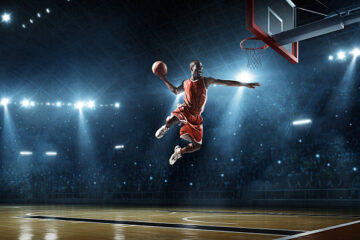Mental Toughness in sports: Maintaining focus and composure during intense matches

by Robin Alexander August 12, 2024
Over the past few decades, the field of sports psychology has grown tremendously as athletes and coaches recognize the importance of mental conditioning. While physical talent and training remain essential for success, psychological factors such as mental toughness, focus, and composure under pressure are equally if not more critical in determining outcomes, especially in close games and high-pressure situations.
This blog post will explore the concept of mental toughness in sports, with a particular focus on maintaining concentration and emotional control during intense matches. I will discuss what mental toughness means, why it is so important for performance, and provide practical strategies athletes can use to strengthen their mental game and stay locked in even when the stakes are high.
My goal is to help both amateur and professional competitors of all levels enhance their mental skills through a deeper understanding of what it takes mentally to compete at an elite level. While raw physical gifts and technical skills are often out of our control, the mind is something we can continually train and strengthen over time through dedicated practice. With enough mental conditioning work, any athlete has the potential to rise to the occasion when it matters most.
Mental Toughness in sports: Maintaining focus and composure during intense matches:
What is Mental Toughness?
Before delving into specific strategies, it’s important to properly define what mental toughness means in a sports context. At its core, mental toughness refers to an athlete’s ability to maintain mental focus, emotional control, and confidence in themselves and their abilities despite challenging circumstances, heavy pressure, injuries, fatigue, discomfort or pain.
Mentally tough athletes possess qualities like grit, perseverance, resilience, composure under pressure, and an unwavering belief that they can overcome any obstacle that stands between them and victory. Even when facing adversity, setbacks or when the odds seem stacked against them, mentally tough competitors refuse to give up hope and stay determined to find a way.
Some key characteristics of mental toughness in sports include:
● Thriving under pressure – Performing better, not worse, when the stakes are highest. Mentally tough athletes raise their game rather than crumble in important matches.
● Concentration – Having the mental discipline to block out distractions and stay 100% focused on the task at hand for extended periods of time, even when tired or facing challenges.
● Composure – Maintaining emotional control and poise in stressful situations rather than panicking or losing composure. Channelling strong emotions like anger or frustration into a positive driving force rather than letting them derail performance.
● Resilience – Quickly bouncing back from setbacks without dwelling on mistakes or defeats. Using failures as learning lessons rather than reasons to lose confidence.
● Self-belief – An unshakeable, unwavering belief and faith in one’s own abilities regardless of external factors, as well as persistence in the face of obstacles or adversity. Mentally tough athletes don’t doubt themselves.
● Mental preparation – Treating the mind with the same level of rigour as the body through ongoing mental skills training, visualisation, relaxation techniques and other psychological methods for building inner strength.
Why Mental Toughness Matters
The importance of mental toughness cannot be overstated, especially at the highest levels of competition where margins between winning and losing are razor thin and almost every athlete has superb physical gifts and technical abilities. Small differences in mental strength and resilience are often what separate the champions from the nearly men.
Countless major sporting events and championships have been won or lost based primarily on the mental fortitude of the competitors involved rather than any technical or physical edge. How an athlete responds mentally to pressure, opponents’ runs or momentum shifts, controversial calls, injuries and more can make or break them.
frame of 8 ball pool
Some key reasons why developing mental toughness is so important include:
● Thriving under pressure – Mentally toughening yourself to perform at your best when the stakes are highest rather than wilting gives a huge psychological advantage. Pressure often breaks the weaker-minded.
● Staying focused – Maintaining razor-sharp focus and cutting out distractions for long periods, even when fatigued, allows you to fight to the very end rather than lose concentration at crucial moments.
● Composure – Keeping cool composure and channelling emotions constructively rather than losing your head to anger or frustration keeps performance on track through adversity.
● Resilience – Quickly bouncing back from mistakes or temporary setbacks without lingering keeps you in the moment and stops minor issues from spiralling into bigger problems.
● Self-belief – A deep, unshakeable belief in yourself prevents doubts from creeping in and sabotaging your confidence, determination and performance when it matters most.
● Mental preparation – Taking your mental conditioning just as seriously as physical through constant skills training gives you an invisible but vital edge over less mentally prepared opponents.
For all these reasons and more, mental toughness has perhaps the highest carryover and impact of any sports skill, both in training and competition. It separates the contenders from the pretenders and often makes the difference between glory and disappointment.
Mental Toughness Strategies
With an understanding of what mental toughness means and why it’s so important, let’s now explore some practical strategies athletes can use to build and strengthen their mental game for competition. These include tactics, drills and exercises proven to enhance focus, resilience, self-belief and composure under pressure.
Visualisation
Visualisation is one of the most impactful mental skills training methods. By vividly imagining themselves successfully executing their skills and overcoming challenges, athletes program their subconscious minds for success. Visualisation should be used daily, picturing both training sessions and upcoming competitions in fine detail with intense emotional experience. This primes the mind and body to perform at a higher level through self-fulfilling prophecy.
Positive Self-Talk
What we say to ourselves heavily influences our mental state, confidence and performance. Catching and correcting negative thoughts and replacing them with positive, empowering self-talk is tremendously powerful for building mental toughness. Affirming belief in your abilities, visualising success and using “I will” statements to declare your intentions can become a self-fulfilling prophecy.
Mental Toughness Exercises
Short but intensive mental exercises, like holding a plank pose through discomfort or doing wall sits with a timer, train your mind to better handle pressure, discomfort and adversity. Simple drills that get the heart rate up while visualising competitive scenarios strengthen mental and physical resilience at the same time.
Breathing Techniques
Conscious breathing techniques ranging from simple mindfulness of breath to box breathing or other paced breathing methods can powerfully reduce stress and anxiety while enhancing clarity, focus and composure. Making breathing an active part of your pre-performance routine primes the relaxation response.
Defining Success
Shifting your thoughts about success from winning to effort, performance and self-improvement reinforces an internal rather than external focus that boosts confidence, composure and resilience to results beyond your control like outcomes. Letting go of attachment enhances flow.
Meditation/Mindfulness
Practising daily meditation trains the mind to let go of thoughts, embrace the present and reduce stress reactivity. Taking a mindful approach enhances mental clarity, focus, self-awareness and ability to brush off distractions from the past or future during competition. Even 5-10 minutes daily makes a big difference.
Journaling
Regular journaling builds mental resilience by allowing athletes to better understand their thought patterns and express competitive experiences. It’s a forum for evaluating performances honestly while bolstering self-belief and channelling lessons learned during challenges and setbacks.
Commitment to Growth Mindset
Adopting a growth rather than fixed mindset trains the brain to view failure and adversity as learning opportunities rather than threats, building grit and perseverance. With a growth mindset, mental setbacks motivate improvement rather than discouragement.
Read full article at CueBall Chronicles.
Read full article here- https://www.cueballchronicles.com/post/mental-toughness-in-sports-maintaining-focus-and-composure-during-intense-matches
Welcome to CueBall Chronicles, your ultimate destination for all things snooker and pool. We are passionate cue-sport enthusiasts dedicated to bringing you the latest updates, insights, and stories from the green baize world.
Our Website: https://www.cueballchronicles.com/
articlebiz.com







No Comment